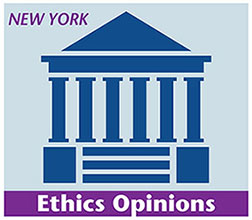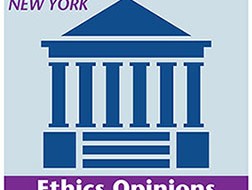Recent N.Y. Ethics Opinions: June 2015
By Tyler Maulsby, Associate, Frankfurt Kurnit Klein & Selz
Here are summaries of four ethics opinions issued in January, February, and April 2015. The first three were issued by the NYSBA Committee on Professional Ethics, and the fourth by the NYC Bar Association Committee on Professional Ethics. NYLER will continue to provide updates on new ethics opinions issued by these and other ethics committees in New York State.
For information about how to obtain an ethics opinion from the NYS Bar Association Committee on Professional Ethics, please visit http://www.nysba.org/Ethics/.
For information about how to obtain an ethics opinion from the NYC Bar Association Committee on Professional Ethics, please visit http://www.nycbar.org/ethics/informal-ethics-opinions/.
NEW YORK STATE BAR ASSOCIATION OPINIONS
NYSBA Ethics Op. 1045 (Jan. 8, 2015):
How an Investigation Could Lead to Disqualification
An in-house lawyer for a corporation has been asked to sit for an interview with an administrative agency investigating a complaint a third party brought against the corporation. The interview involves a meeting between the corporation and the third party, at which the lawyer was present. The corporation does not object to the interview and none of the information is privileged or otherwise constitutes confidential information. The Committee concluded that the in-house lawyer was ethically permitted to sit for the interview. If the agency decided to proceed with formal charges against the corporation, however, the administrative proceeding would fit the definition of a “tribunal” under Rule 1.0(w), owing to the agency’s adjudicative role. If the lawyer is likely to be a “witness on a significant issue of fact” in the proceeding, he would be prohibited under Rule 3.7 from representing the corporation before the “tribunal,” absent an exception. The lawyer may participate in the matter outside the tribunal, for example by instructing outside counsel.
The full opinion is available at: http://www.nysba.org/CustomTemplates/Content.aspx?id=54113.
NYSBA Ethics Op. 1046 (Jan. 8, 2015):
Conflicts of Interest When Representing an Incapacitated Client
The inquiring attorney would like to accept court appointments for Alleged Incapacitated Persons (AIP’s) in guardianship proceedings under New York’s Health and Mental Hygiene Law. However, the lawyer’s firm regularly represents a health care facility — which is a party in guardianship proceedings—on matters unrelated to the guardianship proceedings. The Committee first addressed the three different roles the lawyer could be appointed to in a guardianship proceeding: (i) Court Evaluator; (ii) Guardian; or (iii) independent counsel. The Committee concluded that in the first two roles — Court Evaluator and Guardian — there is no attorney-client relationship between the lawyer and the AIP, and therefore, Rule 1.7, which governs conflicts with current clients, does not apply. If the lawyer is appointed as independent counsel for the AIP, however, an attorney-client relationship exists. At that point, Rule 1.7 applies, and lawyer would have to determine if the AIP and the facility have “differing interests” under Rule 1.7(a)(1) or if the lawyer had a personal interest conflict under Rule 1.7(a)(2). If the lawyer determines that there is a conflict under Rule 1.7, the next question is whether the conflict is consentable. Citing to prior opinions, the Committee concluded that such a conflict could be consentable, depending on the interests of the AIP and the facility. However, even if the conflict is consentable, in some cases it still may be difficult to obtain informed consent from the AIP as required by Rule 1.7(b)(4). The Committee cautioned that “a lawyer must take special care when obtaining consent from a person who may be, or has been deemed to be, incapacitated and under guardianship.”
The full opinion is available at: http://www.nysba.org/CustomTemplates/Content.aspx?id=54128.
NYSBA Ethics Op. 1047 (Feb. 17, 2015):
Investigations by Government Attorneys and the No-Contact Rule
A lawyer for a government agency is conducting an investigation into accusations of fraud against a private lawyer relating to claims submitted to the agency. The government lawyer asked the Committee whether he could interview the private lawyer’s client without violating Rule 4.2, otherwise known as the “no-contact” rule. The Committee concluded that the answer depended on whether the investigation was part of a “separate matter” within the meaning of Rule 4.2 and, if so, whether the government lawyer knows that the private lawyer’s client is represented in that separate matter. Owing to the broad interpretation of the term “party” in the Rules and past ethics opinions, the Committee considered the private lawyer’s client to be a “party” under the Rules. Whether the client’s matter before the agency and the government lawyer’s investigation were the same or different matters will depend “on the extent to which the central events and issues of the claim proceeding are the same and on whether the communication may have an effect on the outcome of the claim proceeding.”
For instance, if the investigation concerns allegations of fraud by the lawyer in the prosecution of the client’s claim, then the investigation would likely constitute the same matter as the client’s claim. On the other hand, if the alleged fraud by the private lawyer was unrelated to the client’s claim, then the investigation and the claim may be different matters. Whether the investigation and the client’s claim are likely to be the same or different matters, the Committee opined, would also affect whether the government lawyer “knows” that the private lawyer represents the client with respect to the investigation. Finally, even if the government lawyer knows that the client is represented in the investigation, the government lawyer may still interview the client if he is “authorized by law” to do so. The Committee concluded, “[u]ltimately, what is ‘authorized by law’ is a legal question beyond the jurisdiction of this Committee.” The Committee noted, however, that while Comment [5] to Rule 4.2 suggests that communications “authorized by law” may include investigative activities of government entities, that statement “does not constitute a blanket exemption from Rule 4.2 for government lawyers *** unless the communications are indeed authorized by law.”
The full opinion is available at: https://nysba.org/CustomTemplates/Content.aspx?id=54926&css=print.
NEW YORK CITY BAR ASSOCIATION OPINIONS
N.Y. City Formal Ethics Op. 2015-3 (April 2015):
Lawyers Who Fall Victim to Internet Scams
Opinion 2015-3 addresses a lawyer’s ethical duties when he suspects or discovers that he is the target of an Internet-based trust account scam. Since 2009, various internet scams have defrauded lawyers out of more than $70 million. Many of these scams are highly sophisticated, involving parties that appear to represent legitimate international corporations and involve high-quality counterfeit checks that can take banks weeks to discover. The question then, is what ethical duties does a lawyer have to someone who is merely posing as a prospective client but whose purpose is to defraud the attorney? Citing to NYSBA Ethics. Op. 923 (May 18, 2012), the Committee opined that when the purported prospective client is actually attempting to defraud the lawyer, that person is neither an actual nor a prospective client and therefore the lawyer’s duty of confidentiality under Rule 1.18(b) does not apply. The Committee reasoned that “if the attorney has not yet determined that the prospective client is trying to defraud the attorney, then the attorney is still bound by Rule 1.18(b) and may not disclose confidential information about the client including to banking and law enforcement authorities.” However, if the attorney concludes that the purported potential client is trying to defraud him, the attorney may supply banks or law enforcement authorities with otherwise confidential information. The Opinion cautions that if a lawyer does fall victim to an Internet scam, he may have breached ethical duties to other clients of the firm, such as the duty of competence [Rule 1.1] and the duty of a lawyer as a fiduciary [Rule 1.15(a)]. Additionally, the loss of those client funds triggers the lawyer’s Rule 1.4(a)(1)(iii) duty to immediately notify all affected clients. The Opinion also lists a number of elements that may alert an attorney to a scam.
The full opinion is available at: http://www.nycbar.org/ethics/ethics-opinions-local/2015opinions/2161-formal-opinion-2015-3-lawyers-who-fall-victim-to-internet-scams#_ftnref1.
Get CLE Credit for this month’s articles (June 2015).
DISCLAIMER: This article provides general coverage of its subject area and is presented to the reader for informational purposes only with the understanding that the laws governing legal ethics and professional responsibility are always changing. The information in this article is not a substitute for legal advice and may not be suitable in a particular situation. Consult your attorney for legal advice. New York Legal Ethics Reporter provides this article with the understanding that neither New York Legal Ethics Reporter LLC, nor Frankfurt Kurnit Klein & Selz, nor Hofstra University, nor their representatives, nor any of the authors are engaged herein in rendering legal advice. New York Legal Ethics Reporter LLC, Frankfurt Kurnit Klein & Selz, Hofstra University, their representatives, and the authors shall not be liable for any damages resulting from any error, inaccuracy, or omission.
Related Posts
« When Case-Within-a-Case Method Helps Plaintiffs Prove Legal Malpractice Understanding & Securing the LLP Shield in New York (Part 1) »







